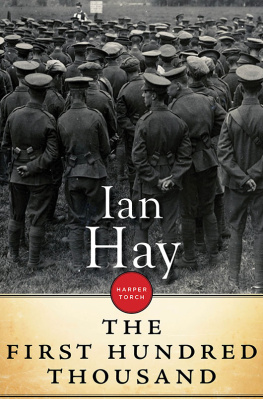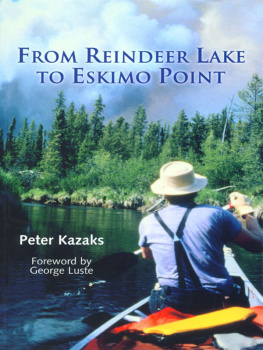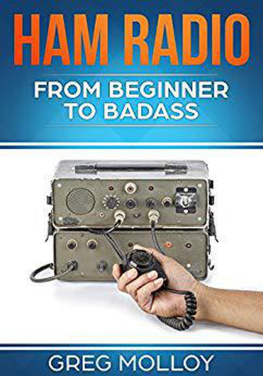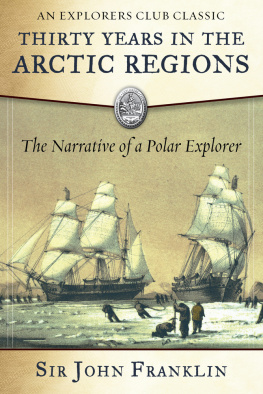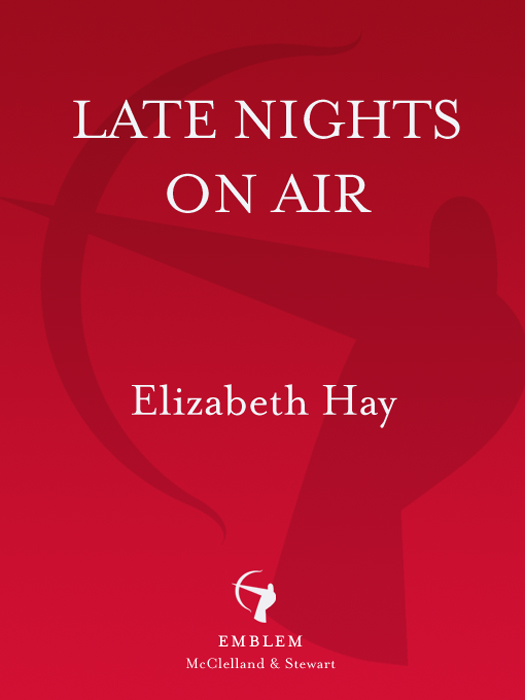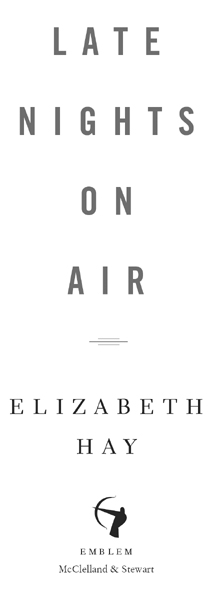PRAISE FOR
Late Nights on Air
Written by a master storyteller.
Winnipeg Free Press
A mesmerizing novel. Hay A mesmerizing novel. a magnificent job of painting the Norths indelible effect on the people who try to make it home.
Calgary Herald
Engrossing. Like her earlier novels, A Student of Weather and Garbo Laughs, Late Nights on Air is elegant, polished and keenly intelligent. It is also deeply moving and wonderfully observed, a book the charmed reader will not soon forget.
London Free Press
Hays novel is magical.
Quill & Quire
A love story, but of muted, smothered love, passion that blossoms not at first sight but at first hear. Hays writing is so alluring and her lost souls so endearing that youll lean in to catch the storys delicate developments as these characters shuffle along through quiet desperation and yearning.
Washington Post
An elaborate and finely honed narrative. Hay is [a] skilled and original writer.
New York Times Book Review
The novel unfolds as a long, lovely examination of how we learn to see ourselves in the places we choose to live.
Chicago Tribune
A splendid achievement.
Jury citation, the Scotiabank Giller Prize
BOOKS BY ELIZABETH HAY
FICTION
Crossing the Snow Line (stories, 1989)
Small Change (stories, 1997)
A Student of Weather (2000)
Garbo Laughs (2003)
Late Nights on Air (2007)
NON-FICTION
The Only Snow in Havana (1992)
Captivity Tales: Canadians in New York (1993)
HARRY WAS IN HIS LITTLE HOUSE on the edge of Back Bay when at half past twelve her voice came over the radio for the first time. A voice unusual in its sound and unusual in itself, since there were no other female announcers on air. He listened to the slow, clear, almost unnatural confidence, the low-pitched sexiness, the elusive accent as she read the local news. More than curious, already in love, he walked into the station the next day at precisely the same time.
It was the beginning of June, the start of the long, golden summer of 1975 when northern light held that little radio station in the large palm of its hand. Eleanor Dew was behind the receptionists desk and behind clever Eleanor was the studio. She looked up, surprised. Harry rarely darkened the station door except at night when he came in to do the late shift and got away with saying and playing whatever he liked. He paused beside her desk and with a broad wink asked about the new person on air.
Hired off the street, she told him. The parting shot of our erstwhile manager.
Well, well, well, said Harry.
Despite the red glow of the on-air light, he then pushed through the studio door, only to be met by one of the great mysteries of life. We look so very different from the way we sound. Its a shock, similar to hearing your own voice for the first time, when youre forced to wonder how the rest of you comes across if you sound nothing like the way you think you sound. You feel dislodged from the old shoe of yourself.
Harry had pictured somebody short and compact with sun-bleached hair, fine blue eyes, great legs, a woman in her thirties. But Dido Paris was tall, big-boned, olive-skinned, younger. Glasses. Thick, dark, springy hair held back off a wide face. Faintest shadow on her upper lip. An unreasonably beautiful woman. She didnt look up, too intent on the newscast typed in capital letters on green paper, three-part greens, the paper-and-carbon combination the newsmen typed on.
He turned to check who was in the control room. Eddy at the controls and one of the newsmen standing at Eddys shoulder. An audience, in other words.
Harry took out his lighter, flicked it, and put the flame to the top corner of the green. And still she didnt look up.
An upper lip as downy as he imagined her legs might be. And yes, when she stood up later and came around the table, her legs were visible below a loose blue skirt, and the mystery of her voice was solved. She was European. European in her straightforwardness, her appearance, her way of speaking, which was almost too calm, except when the page was alight. Then her voice caught fire. She stopped turning her long pencil end on end, pacing herself. Stopped speaking altogether. Her eyes went in two directions one leg on shore, the other in the canoe, but the canoe was pulling away from shore and shit she picked up her glass, poured water on the flames, and read with jolting speed, repressed panic, to the very last word at the bottom of the page.
The news clip came on, she switched off her microphone and looked up wildly at the man with the boyish gleam in his eye. But he wasnt boyish, he was balding, bespectacled, square-jawed. She noticed his cauliflower ear.
Youre Harry Boyd, she said.
And she, too, had imagined another facea big, bushy head to go with the relaxed, late-night growl that she heard only as she fell asleep. The man whod once been a big name in radio, shed been told. He was shorter than shed expected and his hands trembled.
Half an hour later, perched on Didos desk, bumming a cigarette, Harry asked her how shed come by her intriguing accent. She studied him, not quite willing to forgive his outrageous behaviour, until he asked if she was Greek. Then out bubbled her easy and seductive laugh.
No chance. Shed grown up in the Netherlands near the German border, the daughter of a Latin teacher whod listened to the BBC and written questions to London Calling about expressions he didnt understand. Her father had a reel-to-reel tape recorder and taped programs off the radio. She learned English at school, she told Harry, but her pronunciation was terrible and so shed asked her father to make some tapes for her, and then she practised her English listening to Margaret Leighton reading Noel Coward and to Noel Coward himself, acquiring in that way her peculiar European-English accent, which she hated. I figured marriage to a Canadian would solve my problem, but it hasnt.
Two minutes, said Harry, and youre already breaking my heart.
It didnt last, she said.
Then we have something in common, you and I.
He slipped her glasses off her face and breathed on the lenses and polished them with his handkerchief, then slid them back over her nose, saying, And Dorothy Parker said men never make passes at girls with glasses.
Parker?
Dorothy. A writerly wit who famously claimed to be too fucking busy and vice versa.
Dido was only semi-amused. To Eleanor the next day she called Harry the loser, a put-down softened by her accent; it came out lose-air. She said hed taken a drag off her lit cigarette, then set it back on the ashtray. So cheap, she said with a shake of her head and a faint, unimpressed smile.
But not without charm, countered Eleanor. Charm, sex, insecurity: thats what Harry has to offer.
Dido was more interested now.
Hes too old for you, Dido.
But his age was the last thing Dido minded.
Harry was forty-two. Winds of ill repute had blown him back up on these shoresa man with a nearly forgotten reputation for brilliance, one of those lucky luckless people who finds his element early on and then makes the mistake of leaving itradio for a television talk show, where hed bombed. In short order, he was fired, his personal life fell apart, rumours rose up and settled down. A year ago an old boss stumbled across him sleeping in a hotel lobby in Toronto and pulled a few strings to get him a night shift in the Northern Service, the very place where hed started out fifteen years ago. At square one again, but with a difference. Now he was an




